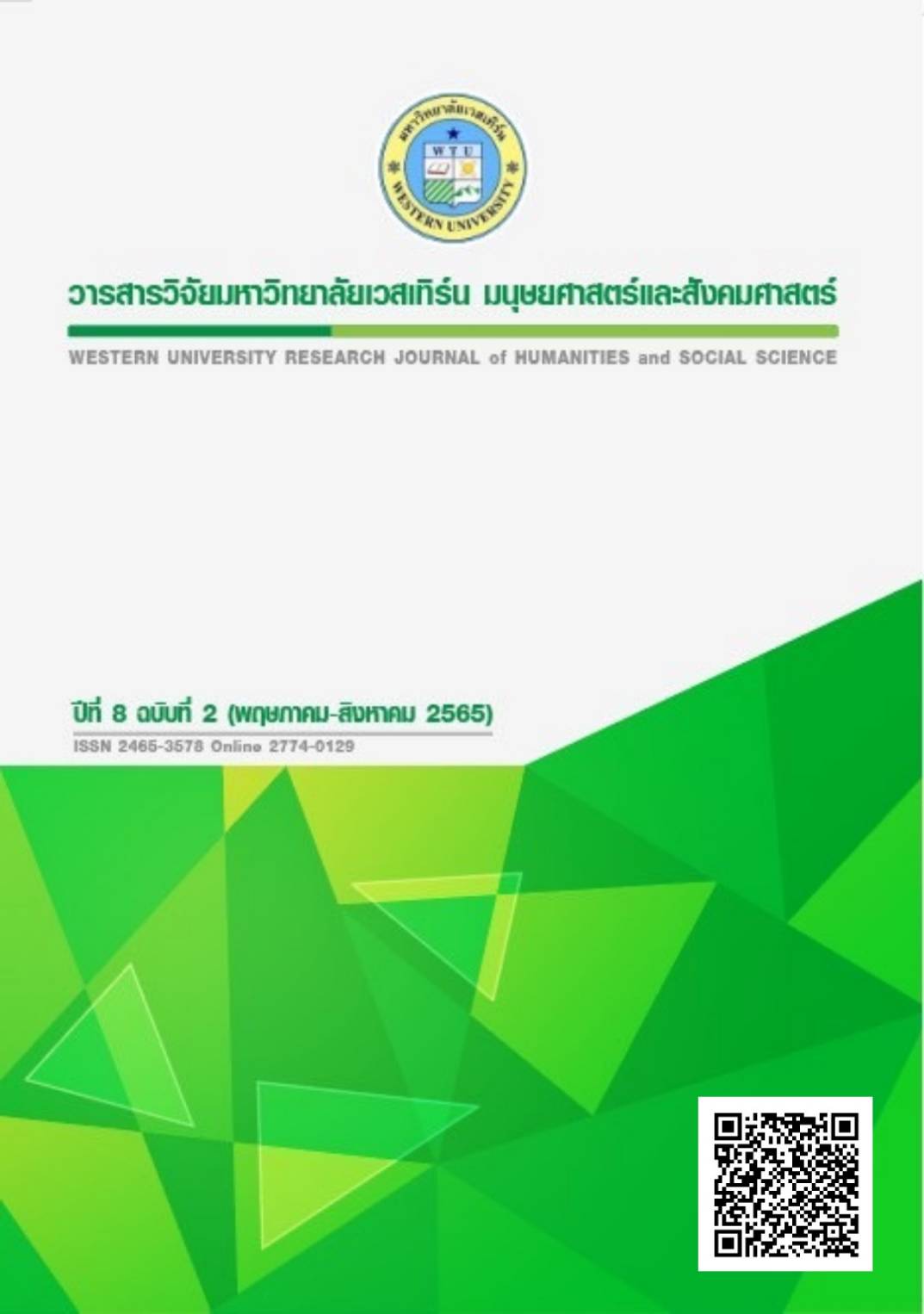ทักษะที่มีผลต่อประสิทธิภาพด้านการบริการของพนักงานโรงแรมยุคใหม่
Main Article Content
บทคัดย่อ
การระบาดของโรคติดเชื้อไวรัสโคโรน่า 2019 (Covid -19) ส่งผลกระทบต่ออุตสาหกรรมโรงแรมทั่วโลกอย่างหลีกเลี่ยงไม่ได้ แต่ความหวังในการฟื้นตัวของธุรกิจยังมีการคาดการณ์อยู่เป็นระยะว่าธุรกิจโรงแรมจะกลับมาดำเนินการได้เหมือนเดิม ดังนั้น การเตรียมตัวสำหรับการกลับเข้าสู่ภาวะปกติของธุรกิจโรงแรมในอนาคตจึงเป็นสิ่งที่ควรตระหนักเพราะวิถีโลกที่เปลี่ยนไป จะส่งผลให้มีการเปลี่ยนแปลงกลยุทธ์การบริหารงานบริการตามสถานการณ์ของโลกยุคใหม่ คือ การบริการแบบดั้งเดิมเปลี่ยนไปเป็นการบริการเฉพาะบุคคลมากขึ้น บุคลากรของโรงแรมจำเป็นต้องเพิ่มทักษะใหม่ ๆ เพื่อความเหมาะสมในการเปลี่ยนแปลงนั้น บทความนี้จึงมุ่งศึกษาทักษะบริการของพนักงานโรงแรม ยุคใหม่ที่สามารถปลูกฝังให้มีอยู่ในตัวเองและพร้อมที่จะถูกดึงออกมาใช้ในการให้บริการกับลูกค้าในบริบทที่ต่างกันอย่างเหมาะสม คือ เน้นการใช้ทักษะความฉลาด ประกอบด้วยความฉลาดทางอารมณ์ (Emotional Intelligence: EQ) ความฉลาดเชิงวัฒนธรรม (Cultural Intelligence: CQ) และความฉลาดเชิงประสบการณ์ (Experiential Intelligence: ExQ) เพื่อการบริการลูกค้าในช่วงระหว่างและหลังการระบาดของโควิด-19 ที่การใช้บริการของลูกค้าจะมีเงื่อนไขการรับบริการมากขึ้น โดยมิติความฉลาดทั้ง 3 ด้าน นับเป็นองค์ประกอบของคุณลักษณะใหม่ของพนักงานโรงแรมในประเทศไทย เป็นประโยชน์ต่อกระบวนการบริการและการแก้ไขปัญหาในงานอย่างมีประสิทธิภาพสอดคล้องกับสถานการณ์ สร้างแรงจูงใจในการปฏิบัติงานของพนักงาน และเป็นประโยชน์ต่อหน่วยงานที่มีหน้าที่ผลิตทรัพยากรบุคคลเพื่อสร้างความพร้อมในการพัฒนาบุคลากรสู่ธุรกิจโรงแรม และสถานประกอบการโรงแรมยังสามารถนำไปพัฒนากลยุทธ์ เพื่อสร้างความพึงพอใจและความประทับที่ให้กับลูกค้า
Article Details

อนุญาตภายใต้เงื่อนไข Creative Commons Attribution-NonCommercial-NoDerivatives 4.0 International License.
เอกสารอ้างอิง
ธัญญา ผลอนันต์ และจุไรพร วิสุทธิกุลพาณิชย์. (2551). ใช้หัวก่อน. กรุงเทพฯ: ขวัญข้าว’94.
Ali, F., Hussain, K., Ragavan, N. A. (2014). Memorable customer experience: examining the effects of customers experience on memories and loyalty in Malaysian resort hotels. Procedia Social and Behavioral Sciences, 144, 273-279.
Baum T. (2006). Reflections on the Nature of Skills in the Experience Economy: Challenging Traditional Skills Models in Hospitality. Journal of Hospitality and Tourism Management, 13(2), 124-138.
Baum T. (2006). Human Resource Management for Tourism, Hospitality and Leisure: An International Perspective. London, Thomson Learning.
Brunner-Sperdin, A. and Peters, M. (2009). What influences guests’ emotions? The case of high-quality hotels. International Journal of Tourism Research, 11, 171-183.
Earley, P.C. and Ang, S. (2003). Cultural Intelligence: Individual Interactions Across Cultures. Palo Alto, CA: Stanford University Press.
Earley, P. C., Ang, S., & Tan, J. (2006). CQ: Developing cultural intelligence at work. Palo Alto, CA: Stanford University Press.
Earley, P. C., & Mosakowski, E. (2004). Cultural intelligence. Harvard Business Review. 82(10), 139–146.
Fitzgerald, H. (1998). Cross Cultural Communication for the Tourism and Hospitality Industry. Melbourne, Hospitality Press.
Gardner, H. (1997). Extraordinary Minds: Portraits of Exceptional Individuals and an Examination of our Extraordinariness. New York, NY. Basic Books.
Goleman, D., Davidson, R., (2017). Altered Traits: Science Reveals How Meditation Changes Your Mind, Brain, and Body. NY, Avery Books.
Hemmington, N. (2007). From service to experience: understanding and defining the hospitality Business. The Service Industries Journal, 27(6), 747-755.
Kihlstrom, J.F. and Cantor, N. (2000). “Social intelligence”, in Sternberg R.J. (Ed.). Handbook of Intelligence. Cambridge University Press.
Knutson, B., Beck, J., Him, S. and Cha, J. (2006). Identifying the dimensions of the experience construct. Journal of Hospitality & Leisure Marketing, 15(3), 31-47.
Lemon, K.N., & Verhoef, P.C. (2016). Understanding customer experience throughout the customer journey. Journal of Marketing, 80(6), 69–96.
Mayer, J. D. and Salovey, P. (1997). “What is Emotional Intelligence?”. In Emotional Development and Emotional Intelligence, Edited by: Salovey, P. and Sluyter. D. New York: Basic Books.
Morgan, M., Watson, P. and Hemmington, N. (2008). Drama in the dining rooms: theatrical perspectives on the foodservice encounter. Journal of Foodservice, 19(2), 111-118.
Pine, B. J., Pine, J., & Gilmore, J. H. (1999). The experience economy: work is theatre & everybusiness a stage. Harvard Business Press.
Salovey, P. and Mayer, J. (1990). “Emotional intelligence”. Imagination, Cognition and Personality. 9(3), 185-211.
Schmitt, B. Simonson, A. (1997). Marketing Aesthetics. New York, The Free Press.
Sørensen, F., & Jensen, J. F. (2015). Value creation and knowledge development in tourism experience encounters. Tourism Management, 46, 336–346.
Yachin, Jonathan. (2018). The ‘customer journey’: Learning from customers in tourism experience encounters. Tourism Management Perspectives, 28, 201.


